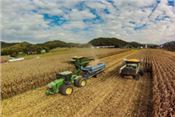Consider Drying Remaining Corn Crop
LEXINGTON, KEN.
High energy costs and wet weather have delayed the harvest of what is expected to be a record corn crop for the state. To preserve yield and quality, a University of Kentucky agricultural engineer is recommending producers consider harvesting and mechanically drying corn still left in the field.
“Wet weather and higher energy costs certainly have the potential to squeeze producers’ profits, especially if additional wet weather further delays harvest and losses climb above the average of 5 percent,” said Sam McNeill, agricultural engineer in the UK College of Agriculture, Food and Environment. “Even with this season’s high energy prices, most producers could benefit from heated air drying their crop by at least five moisture points.”
The National Agricultural Statistics Service is projecting Kentucky corn producers will harvest 268 million bushels this fall with average yields around 185 bushels per acre. If these production levels are realized, it would make the 2021 crop the largest on record.
McNeill calculated yields of 150, 200 and 250 bushels per acre by current corn prices of $5 a bushel and projected harvest losses of 2 percent, 5 percent and 8 percent. He then compared them to the costs associated with heated air drying the corn by five and 10 moisture points using current energy prices and average dryer efficiency. He found that producers can expect returns from drying the corn at least five moisture points if they anticipate their harvest losses will be 5 percent or greater. Gains from drying the crop by five points could range from $6 to $48 per acre, depending on yield when all costs are considered.
“This range of values is anticipated this season, but producers can use their own values to quickly estimate a meaningful comparison for their operation,” McNeill said. “The value and satisfaction of knowing the crop is safely out of the field depends on individual operations.”
McNeill has posted a spreadsheet to the UK Biosystems and Agricultural Engineering website to help producers determine the best options for their operation. It is available at https://www.uky.edu/bae/grain-storage-systems ∆

A UK agricultural engineer says harvesting and drying the remaining corn crop may prove more beneficial than field drying.
Photo by Matt Barton, UK agricultural communications.